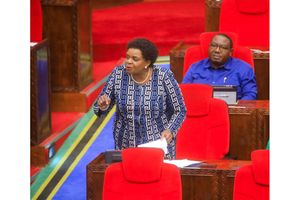Serukamba proposes zero rating of corporate tax on pharmaceutical factories

The Member of Parliament (MP) for Kigoma North, Mr Peter Serukamba (CCM).
What you need to know:
Debating the government’s Sh32.5 trillion budget proposal in Parliament on Monday, June 18, 2018, Mr Serukamba – who doubles as chairman for the Parliamentary Social Development and Services – said by zero rating corporate tax, Tanzania will stand a chance of attracting more and more investors into the sector.
Dodoma. The Member of Parliament (MP) for Kigoma North, Mr Peter Serukamba (CCM) has advised the government to consider zero rating corporate tax for the pharmaceutical sector as a way of attracting more and more investments into the area.
Debating the government’s Sh32.5 trillion budget proposal in Parliament on Monday, June 18, 2018, Mr Serukamba – who doubles as chairman for the Parliamentary Social Development and Services – said by zero rating corporate tax, Tanzania will stand a chance of attracting more and more investors into the sector.
“This will eventually turn Tanzania into the hub of pharmaceutical industries in the region and as a country, we will benefit through export earnings,” Mr Serukamba said.
With data from the Ministry of Industry, Trade and Investment showing that Tanzania is losing over Sh800 billion on importing medicines and medical supplies each year – which forced President John Magufuli to call upon increased investments into the pharmaceutical sector recently – the Finance and Planning Minister, Dr Phillip Mpango had to hit the ground running in his 2018/19 budget proposals.
He immediately announced a Value Added Tax (VAT) exemption on packaging materials produced specifically for use by local manufacturers of pharmaceutical products.
Dr Mpango – who formerly worked as senior economist at the World Bank – also amended the Income Tax Act in order to reduce the Corporate Income Tax rate from 30 per cent to 20 per cent for new investors in the Pharmaceutical and Leather industries for five years starting from year 2018/19 up to 2022/23.
“The measure is expected to promote investment in the manufacturing of pharmaceutical and leather products, create employment opportunities and increase Government revenue,” he said.
But Mr Serukamba said on Monday, June 18, 2018 that the government should go beyond the 20 per cent.
“We should also bring on board existing and new investors…The same should also apply to fertilizer firms. If we zero rate the sector in terms of corporate tax, we will have many companies and we will benefit through exports,” he said.
End




